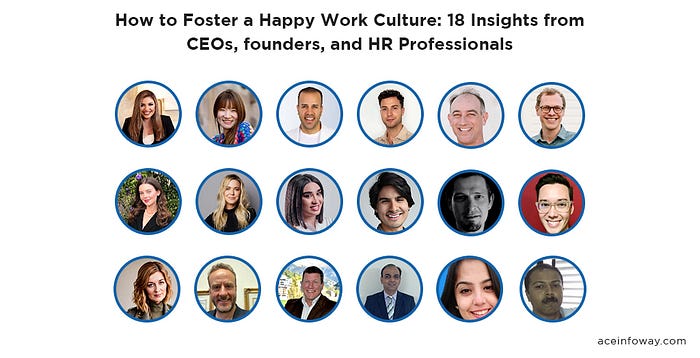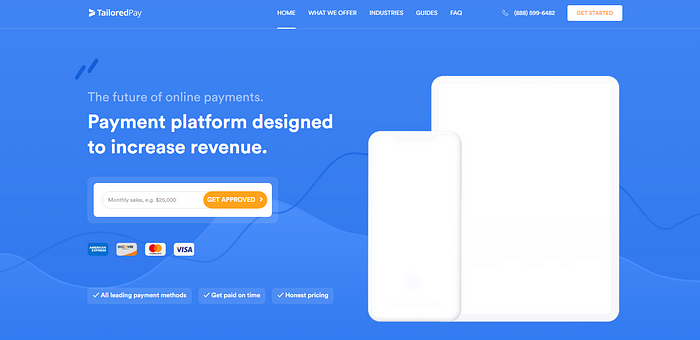Company Culture: A Critical and Valuable Asset to Your Company’s Success

Unsplash by Priscilladupreez
Your work culture is the shared set of values, beliefs and attitudes that guide your organization, and it’s reflected in the way you treat your customers and employees. Workplace culture impacts the types of candidates you attract for open positions, and having a strong work culture also boosts productivity, decreases turnover and improves employee engagement.
Creating a happy work culture is essential for employee satisfaction and productivity. We’ve gathered 17 valuable insights from CEOs, founders, and HR professionals on how they’ve successfully built a positive work environment. From embracing a work-from-anywhere culture to understanding and addressing employee needs, discover the best practices to follow in fostering a happy work culture.

1. Embrace Work-From-Anywhere Culture
Matthew Ramirez, CEO, Paraphrase Tool

The ability to work from anywhere is the cornerstone of our happy work culture.
We’ve encouraged our employees to take full advantage of the freedom to work from anywhere, and the positive results have been incredible.
They’ve been able to spend more time with their families and friends, they’ve been able to travel, and they’ve been able to engage in activities they never thought they’d be able to.
We’ve also seen a huge uptick in productivity and employee retention. When our employees are happy, they work better, they’re more productive, and they stay with the company longer.
2. Promote Individuality and Freedom to Operate
Vipul Shah, COO, Ace Infoway
I believe that happiness and success go hand in hand. That’s why I have a simple mantra that drives everything we do: encourage our teams to express their unique perspectives and ideas, and allow them to work with their own methods and ideas to foster a creative and innovative environment.
This approach helps us build a team of high-performing individuals who are passionate about their work and committed to achieving success.
However, to make this happen, the senior team members must provide support and resources, such as training, mentorship/direction, and access to tools and technology, that can help individuals and teams succeed.
This approach amongst many others — empowers employees to take ownership and be happy to have found their own strengths.
3. Focus on Goals, Not Hours Worked
Michael Loesche, M.D., Ph.D., CEO, USMLE Test Prep
One of the most important aspects of creating a happy work culture is having a strong emphasis on goals and results, as opposed to focusing on hours worked. When employees feel like they can work towards meaningful goals that impact the business, they are much more likely to feel like they are part of a positive work culture. Additionally, setting expectations around hours worked can create a negative work culture where employees feel like they are being punished for not working enough hours. Instead, focus on setting realistic goals that employees can work towards, and reward them for achieving those goals, rather than punishing them for not working enough hours.
4. Evolve Culture and Brand Together
Heather Wilson, Cmp, Founder, The Brand Strategy Tank
Scaling a brand also means scaling its culture. This is especially important for startups, as companies’ early employees have internalized the founders’ values, beliefs, attitudes, and behaviors. These same employees will have calibrated to the market primarily served when they joined the company, which may differ from the market the company is now seeking to serve. While new employees will gravitate toward pursuing the new market, a lack of cohesion between the two groups can create conflict.
To avoid this, it is vital that your culture and brand evolve so that employees see themselves in it. This means involving the entire team in the process of evolving the culture and brand. Otherwise, you may find yourself with two different teams delivering two different results.
Create a values-driven people experience program, from recruitment to onboarding and retention. Celebrate the wins and acknowledge them. No company is perfect. Always learning and growing will improve your culture and brand.
5. Celebrate Everyday Wins Consistently
Daniel Kroytor, Founder and Director, Tailored Pay

Celebrating the team’s every day wins makes recognition a daily practice, motivating employees throughout the year. While we ensure satisfaction throughout the customer journey, we aim to do the same in our employee experience. Acknowledging your staff members’ successes two or three times a year doesn’t inspire them to take ownership of what they do — especially in the remote work environment. But a consistent rewards strategy that helps employees feel like they’re making daily progress in their efforts fuels their drive to perform at their best. And whether that recognition is a shoutout, gift card, or even a hand-written note, knowing what they do is appreciated helps team members understand the value they bring each day.
6. Encourage Collaboration and Open Dialogue
Amy Ling Lin, CEO, sundays studio

Building a happy work culture starts with creating an environment that encourages collaboration, a celebration of successes, and an open dialogue among employees. As a manager, I ensured employees felt respected and appreciated for their hard work by providing recognition for good performance in the form of small gifts or spot bonuses. This uncommon practice not only showed my appreciation for the team’s effort but also motivated the whole group to collaborate better and enjoy coming to work each day. Additionally, I held weekly meetings where funny anecdotes could be shared amongst the team and discussed any burning issues from our past week. Doing this regularly helped release any pent-up stress or tension which in turn improved workplace happiness overall.
7. Leadership’s Role in Company Culture
Katya Hoodikoff, Sr. Recruiter, Houzz

In my experience, a great company culture starts with the highest levels of leadership. These individuals are responsible for setting an example and being good role models for their employees. I am fortunate to work for a company that prioritizes family and work-life balance. Our founders openly speak to the importance of this in nearly every company meeting, and they give real examples of how they practice this daily. A great company culture is defined by how you treat your people.
When you provide opportunities that fit into your employee’s interests and you give them sufficient guidance and autonomy, great things can happen! Instead of creating a toxic environment that is fueled by competition, one must strive to create a culture that inspires creativity and collaboration. This way, people are less afraid to share their ideas, as they know these thoughts are welcomed and appreciated at all levels of the organization.
There are plenty more, all you have to do is go to the link:
How to Build a Happy Work Culture - What It Is, Why It Matters?
Conclusion
Creating a happy work culture requires a holistic approach that prioritizes the well-being of employees while still achieving the company’s objectives. It’s about finding that sweet spot where everyone is thriving, and both personal and business goals are being met. It starts with keeping your employee informed, involved, inspired, and interested.
A happy workplace cultivates employee well-being and fosters loyalty, creativity, and a sense of belonging.
Let’s work together to create a workplace culture that fosters happiness and success. We believe that when employees are happy, they’re more motivated, engaged, and committed to achieving success. To see how we’ve created a culture of Joy + Achievement at our company, check out “Life at Ace”
